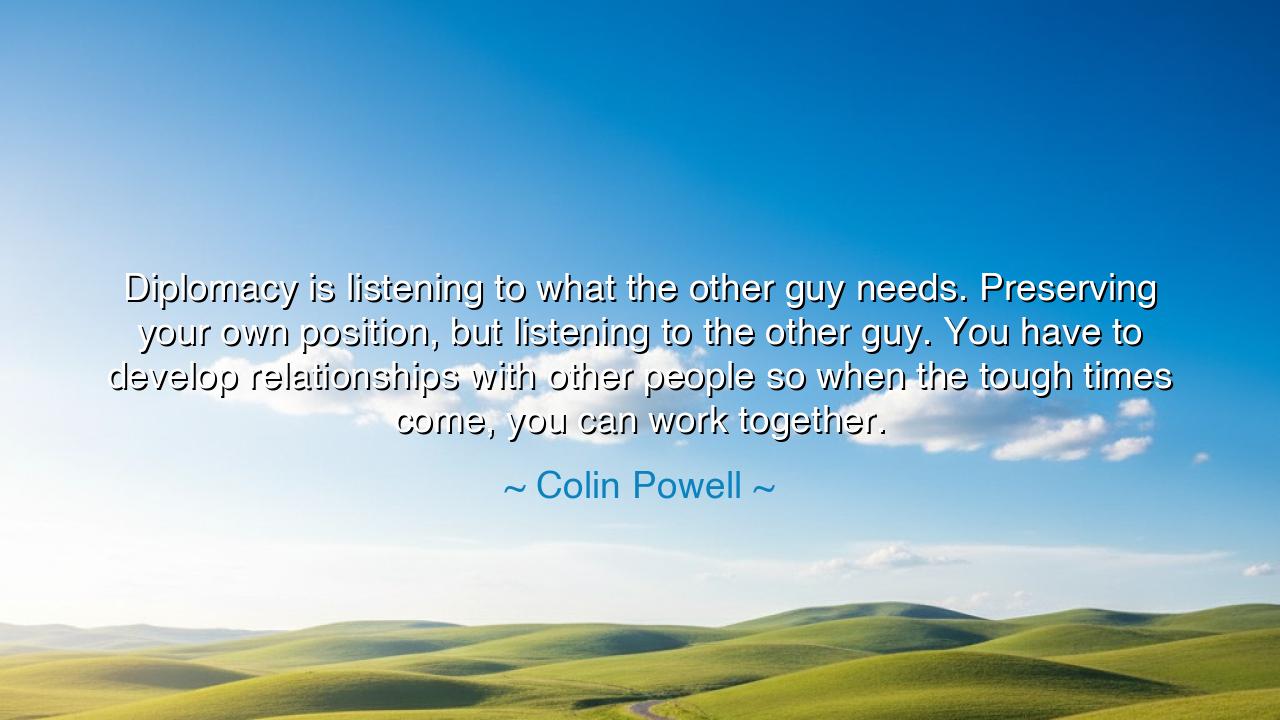
Diplomacy is listening to what the other guy needs. Preserving
Diplomacy is listening to what the other guy needs. Preserving your own position, but listening to the other guy. You have to develop relationships with other people so when the tough times come, you can work together.






In the wise words of Colin Powell, “Diplomacy is listening to what the other guy needs. Preserving your own position, but listening to the other guy. You have to develop relationships with other people so when the tough times come, you can work together,” there lies a timeless lesson in the art of peace and leadership. Diplomacy is not the clash of swords or the loudness of voices, but the quiet strength of listening. It is the ability to hear the desires and fears of others while guarding one’s own principles, walking the narrow path between yielding and standing firm.
The origin of this teaching reaches back to the courts of kings and the councils of wise elders. In ancient realms, wars were often avoided not by might of arms, but by the words of skilled envoys who understood that true power lies in understanding. A ruler who failed to listen sowed discord and ruin, while one who mastered the art of diplomacy brought harmony and lasting alliances. Powell’s words, though spoken in modern times, carry the same eternal truth known to the sages and leaders of old.
To develop relationships is to weave a network of trust, a foundation upon which nations and individuals alike may stand when calamity strikes. In times of ease, these bonds may seem invisible, but when tough times arise, they become the ropes that bind allies together against the storm. Without these cultivated ties, one stands alone, vulnerable to the shifting winds of conflict and betrayal.
Thus, diplomacy is revealed not as weakness, but as a form of strength far greater than brute force. It is the strength of patience, of wisdom, and of foresight. Let every leader and seeker of harmony remember: to listen is to understand, to understand is to unite, and to unite is to endure. When people work together, guided by respect and shared purpose, they may overcome even the gravest of trials, ensuring that peace triumphs over strife and the world is spared the suffering of needless war.






NHNguyen Hoa
Powell’s view on diplomacy offers a thought-provoking perspective on human interaction and collaboration. He emphasizes listening, which is so often overlooked in discussions of diplomacy or negotiation. But is it always possible to listen to others while staying firm on your own position? What happens when the needs of the other party contradict your own? How do we strike the balance between compromise and standing our ground in tough situations?
BNBach Nguyen
Colin Powell’s approach to diplomacy as relationship-building resonates deeply. Listening to others while preserving your own position shows that diplomacy isn't just about negotiating deals but about fostering trust. It makes me wonder: how do you develop these relationships in a world where people often prioritize immediate results over long-term understanding? Are we losing the art of listening in today’s fast-paced, results-driven culture?
LTLinh Tran
I love how Colin Powell highlights the balance between protecting your own interests and listening to others. It really makes me think about how important relationships are, especially in challenging times. In both personal and professional life, do we always take the time to truly listen to others, or do we tend to focus on asserting our own positions? How do we build stronger connections with others to make collaboration easier when challenges arise?
AHanh hung
Colin Powell's perspective on diplomacy really emphasizes the importance of listening and understanding others’ needs. It’s fascinating how diplomacy is framed not just as a way to maintain your own position but as an ongoing effort to build relationships. How often do we overlook the importance of listening in favor of defending our own stance? Can true cooperation occur if we don’t understand the other party’s motivations and concerns?